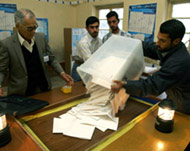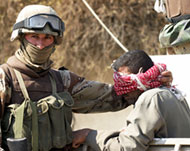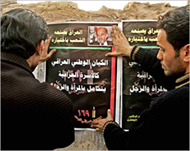Shia list wins most votes in Iraq polls
An alliance of Shia groups won the most votes in Iraq’s 30 January election, but the percentage it received – 47.6% – was lower than many expected, according to the final vote tally released on Sunday.

The Shia list is expected to take 132 seats in the new 275-member National Assembly, according to election commission results.
A coalition of the two main Kurdish parties won 25.4% and a bloc led by interim Prime Minister Iyad Allawi got 13.6%.
Turnout in last month’s election was about 59%, with a total of 8,456,266 people voting, election commission officials said.
Only 2% of eligible Iraqis in the Sunni Arab-dominated Anbar province voted in the elections, and only 29% in the mainly Sunni Salah al-Din province, the final tally showed.
The low turnout in Sunni provinces showed that many Sunni Arabs boycotted the election or stayed away out of fear, potentially worsening sectarian tension in Iraq.
Furious horse-trading
The vote determines the composition of a 275-member National Assembly that must agree on a president and two vice-presidents by a two-thirds majority.
Those three officials will then agree on a prime minister and cabinet, and their choices must be approved by a majority in the assembly.
 |
|
The final tally showed only 2% |
With no bloc gaining dominance on its own, there has already been furious horse-trading to try to strike deals.
The United Iraqi Alliance (UIA) insists that one of its candidates – probably current Finance Minister Adil Abd al-Mahdi or Vice-President Ibrahim al-Jaafari – be appointed prime minister.
The Kurds want their candidate, Jalal Talabani, to be president or prime minister.
Under one scenario, the two blocs could do a deal with a Shia candidate getting the prime minister’s job and Talabani the presidency.
But Allawi, who visited Iraqi Kurdistan on Saturday and met Talabani, may also try to form alliances to improve his chances. If he can make a deal with the Kurds and persuade some of the Shia alliance to break away, he may be able to keep his job.
Political deadlock?
Even if Sunni Arabs are largely shut out of government, they could still potentially veto the new Iraqi constitution due to be written this year, causing political deadlock.
One of the main tasks of the National Assembly is to oversee the drafting of a constitution which must be approved by a referendum.
 |
|
There has been no reduction in |
Armed Sunni groups who have relentlessly attacked US troops, Iraqi security forces and officials have also turned their violence on Shia, raising fears of sectarian civil war.
Iraq has announced it will close its land borders from Thursday to try to prevent a flood of foreign pilgrims arriving for Ashura, one of the holiest events in the Shia calendar, when millions of people converge on shrines in Iraq.
A car bomb exploded near an Iraqi security forces checkpoint on the road between Hilla and Karbala in a mainly Shia area south of Baghdad on Sunday, killing at least one person.
Human bombers attacked pilgrims in Baghdad and Karbala last year, killing 171 people, and Ashura could be a flashpoint again this year, especially if the poll results fuel tension.
Continued violence
The bodies of two men who worked with Allawi’s party were found in a rebellious district of Baghdad on Sunday, police said.
In the northwest of the capital, fighters killed two senior Iraqi army officers and their driver. Al-Qaida network in Iraq claimed responsibility for the attack. In the town of Baquba, northeast of Baghdad, assailants shot dead a Communist party member who was also a local councillor.
 |
|
Clashes between US troops and |
In Mosul, a rocket attack on the city hall building killed at least two people, hospital officials said.
On Saturday, a suicide car bomb killed 18 people in Musayib, a mixed Sunni and Shia town south of Baghdad.
The previous day, a suicide car bomb killed 13 people near a Shia mosque in Balad Ruz, northeast of Baghdad, and fighters attacked a Shia bakery in the capital, killing nine.
Al-Qaida’s wing in Iraq, led by Jordanian militant Abu Musab al-Zarqawi, claimed responsibility for the Balad Ruz attack but said its target was a nearby Iraqi army patrol, not the mosque.
Political sharing
Speaking to Aljazeera from Baghdad on Sunday, Haydar al-Abadi of the UIA addressed the crucial question of power sharing.
Asked whether the UIA will get a large number of seats or portfolios in the new government by virtue of its seat strength, he said: “The dialogue with other different political groups has been postponed pending the outcome of the election. The posts should be distributed according to the results.
 |
|
The Shia list has won most of the |
“We, the Supreme Council for Islamic Revolution in Iraq, and most major groups at the UIA have declared from the very beginning that we want to form a government that includes all Iraqi groups and all Iraqi political structures representing Iraqis.
Al-Abadi added: “We are still insisting on getting all Iraqis represented in the future Iraqi government as Iraq is in need of such representation to enrich the country’s path towards progress.”
When asked how participation can be achieved when there were significant segments of Iraqi society that boycotted these elections, he said, “Some of the groups that boycotted the election were a minority and some others were intimidated or prevented from voting.”
Role for AMS?
Al-Abadi continued: “Some willingly boycotted the election but the majority of Iraqi parties and groups participated in it. The movements that boycotted were few and weak, and that was proved during provisional and municipal elections when they failed to get wide support.
According to him, “all the major movements will be integrated into the political process. As there are 111 lists, it is unlikely that all groups will merge however. We seek and look forward to including the main groups”.
Asked if the Association of Muslim Scholars (AMS) will be invited to join the new government, al-Abadi said: “We have nothing to say in this respect as we do not know whether the AMS is a political movement or a consultative organisation.”
“AMS will have to identify themselves before we can get into any discussion with them,” he said.